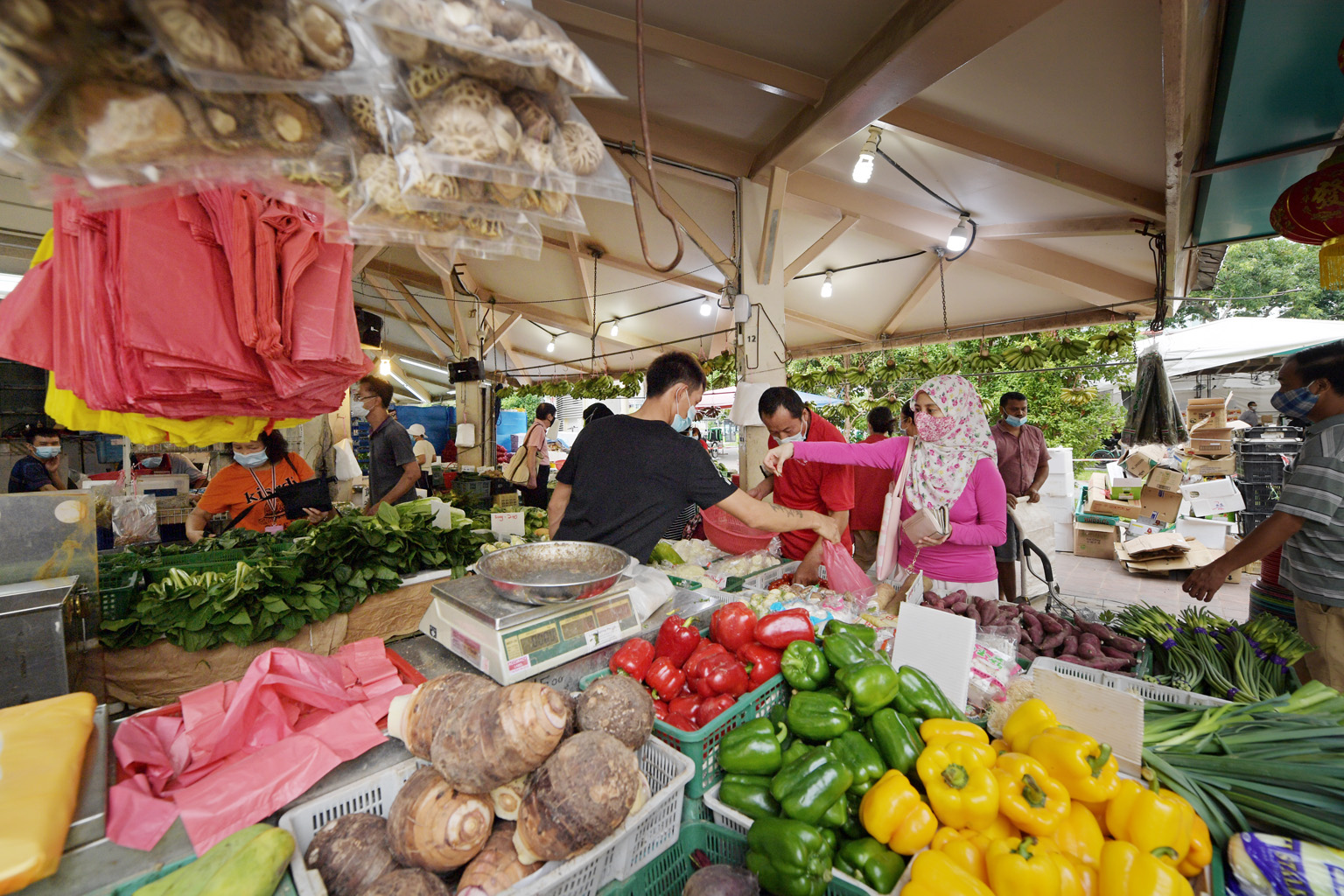Coronavirus: Imports of fresh food remained steady during circuit breaker
Fall in orders from F&B outlets could be offset by demand from households: Expert
Sign up now: Get ST's newsletters delivered to your inbox

People shopping for fresh produce at a market in Block 504 Tampines Central 1 last Saturday. The amount of fresh seafood and meat imported into Singapore between April 1 and May 28 was about the same as the years before, although imports of fresh and chilled fruits and vegetables went up. This came even as dining in at eateries has not been allowed in Singapore since April 7.
ST PHOTO: ALPHONSUS CHERN
The amount of fresh food imported in April and last month did not change much compared with the same period last year and the year before, figures from the Singapore Food Agency showed.
The amount of fresh seafood and meat imported into the Republic between April 1 and May 28 was about the same as the years before, although imports of fresh and chilled fruits and vegetables went up.
This came amid a change in people's eating habits as dining in at eateries has not been allowed in Singapore since April 7, when the country's circuit breaker to stem the spread of Covid-19 kicked in.
Eating places are depending on takeaway and delivery orders, but many still reported a fall in revenue, and some food and beverage (F&B) establishments have said they will be closing permanently.
TreeDots, a social enterprise that channels unsold food from wholesalers and slaughterhouses to F&B businesses, said that before the circuit breaker started, it was selling about 350 tonnes of such unsold food to more than 1,000 F&B establishments islandwide.
But during the circuit breaker, this fell 40 per cent to around 200 tonnes per month, said TreeDots co-founder Nicholas Lim.
Unsold food includes overstocked supplies, less popular cuts of meat such as chicken breast, or food that may be too big or too small for retail packaging, although they are safe for consumption.
With less unsold food being redistributed, it is likely that the excess would be thrown out, Mr Lim told The Straits Times, as suppliers may not want to incur extra costs by maintaining cold rooms to store the surplus.
In January, TreeDots started a pilot project that offered individual consumers the chance to buy such unsold food items.
This has now become a permanent feature of the business, said Mr Lim, and during the circuit breaker, about 1.5 tonnes of such excess food were sold weekly to almost 300 households islandwide.
He said: "Thankfully we get to benefit households with surplus food now and they can play their part in reducing food loss in Singapore."
A spokesman for the National Environment Agency said it collects only yearly food waste data from commercial, industrial and domestic sectors based on waste characterisation studies and surveys.
"We do not have the daily, weekly or monthly breakdown of the food waste generated from each type of premises, including wholesale markets," she said.
She added that while cooked food sections of hawker centres are now limited to takeaways or food delivery only, wet markets have continued their operations throughout the circuit breaker.
Wholesalers who supply to wet markets frequented by individual customers said demand has not been affected.
Mr Goh Thiam Chwee, president of the Singapore Fish Merchants' General Association, said stallholders were innovating and selling their produce on social media.
Mr Tay Khiam Back, chairman of the Singapore Fruits and Vegetables Importers and Exporters Association, said the increase in fruit and vegetables sold could be due to people wanting to stay healthy during the pandemic.
Professor William Chen, the Michael Fam chair professor in food science and technology at Nanyang Technological University, said the import figures during the circuit breaker were not surprising, since the fall in demand from F&B establishments could be offset by the demand from households.
"More Singaporeans are turning to shopping at supermarkets for home cooking. Supermarkets usually have good cold chains to keep the produce fresh, and there may not be any increase in food loss due to storage conditions."
Prof Chen said people may also be more conscious of the need to reduce food waste when they cook and eat at home, compared with when they dine out or have buffets, for example. He added that this should reduce overall food waste.


